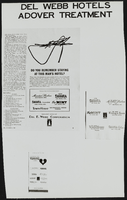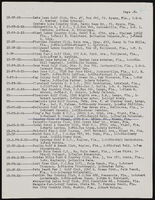Search the Special Collections and Archives Portal
Search Results
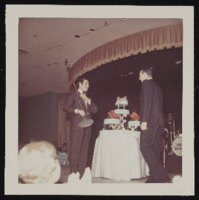
Sands Hotel 16th Anniversary: photographs and event records
Date
Archival Collection
Description
Series VI. Anniversaries of the Hotel Opening -- Anniversaries
Sands Hotel and Casino
Image
Edwina Danzinger oral history interview
Identifier
Abstract
Oral history interview with Edwina Danzinger conducted by Leanne Terry on February 26, 1980 and February 29, 1980 for the Ralph Roske Oral History Project on Early Las Vegas. Danzinger first talks about her family’s early upbringing in Nevada, her involvement in Boy Scouts and her various positions of employment at the University of Nevada, Las Vegas. Danzinger also discusses the changes in the crime rate, air pollution, and the changes made to the university by the Buckley Amendment.
Archival Collection
Manor, Sam Houston, Jr.
Sam Houston Manor, Jr. once lived in Millers, Nevada during the early 1900's.
Person
Hildred Meidell oral history interview
Identifier
Abstract
Oral history interview with Hildred Meidell conducted by Greg Abbott on February 27, 1979 for the Ralph Roske Oral History Project on Early Las Vegas. In this interview, Meidell covers a range of topics about living in Las Vegas, Nevada, from her and her husband’s time as tourists in the city and their subsequent retirement to Las Vegas from Los Angeles, California. Meidell describes the Las Vegas Strip, the interstate and highway conditions between Los Angeles and Las Vegas, as well as their numerous visits to Hoover Dam (Boulder Dam). Moreover, she speaks about the changing layout of the city, the increase in shopping centers and department stores, and the clothing stores inside of hotels. Lastly, Meidell talks about the prominence of churches in local communities, the atomic testing program and the structural damages these tests caused in her neighborhood, and the influence of the railroad and passenger train on the town.
Archival Collection
Clarence Ray oral history interview
Identifier
Abstract
Oral history interview with Clarence Ray conducted by Eleanor L. Walker in 1991 for the African American in Las Vegas: a Collaborative Oral History Project. In this interview, Ray provides details of his ancestry and upbringing, his education, and race relations in the western United States before 1930. He then moves on to his first visit to Las Vegas, Nevada in 1922, and his movements before settling permanently in the 1940s. He explains that the main source of employment for the relatively small Black population during the 1920s and early 1930s was the railroad, but a number were also in business. Mr. Ray provides thumbnail sketches of many of the early residents, and is particularly informative about "Mammy" Pinkston, Mary Nettles, the Stevens family, and the Ensley family. Systemic racial discrimination against Blacks developed in southern Nevada during the 1930s, and Mr. Ray provides some useful details on this along with his discussion of his career in gaming and his social and political activities.
Archival Collection
Stevens, Muriel
Muriel Stevens (1925-2016) is a former newspaper columnist, author, chef, and radio and television host. Born December 22, 1925 in Philadelphia, Pennsylvania, she moved to Las Vegas, Nevada in 1954. Stevens is known for her radio and television shows, which focused on food, nutrition, and consumer issues. She hosted a one hour daily radio talk show for eight years before moving to television, where celebrity guests joined her on The Muriel Stevens Show to cook their favorite meals.
Person
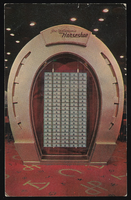
Joe W. Brown's one million dollar horseshoe located in Las Vegas, Nevada: postcard
Date
Archival Collection
Description
Image
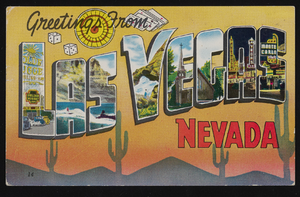
"Greeting from Las Vegas, Nevada": postcard
Date
Archival Collection
Description
Image

